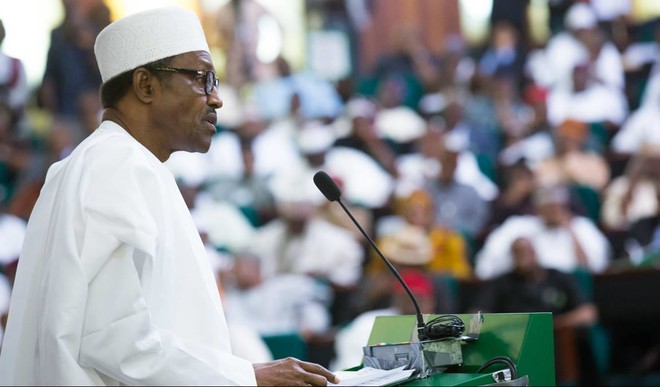National Assembly budget details: Beyond the disclosure
During last Thursday’s plenary sessions of the two chambers of Nigeria’s bicameral National Assembly, the 2017 budget was passed. At the last count it is proceeding to the presidency for assent by the President, who for now is Professor Yemi Osinbanjo as Acting President, in line with the Constitution, and not just as co-ordinator of […]


During last Thursday’s plenary sessions of the two chambers of Nigeria’s bicameral National Assembly, the 2017 budget was passed. At the last count it is proceeding to the presidency for assent by the President, who for now is Professor Yemi Osinbanjo as Acting President, in line with the Constitution, and not just as co-ordinator of the business of government, as was curiously stated in the letter from the President to the National Assembly notifying the institution of his travel to London for medical attention. Also in response to the call by some members of the public, the institution has provided the details of its budget proposal, which as should be observed did not offer any strange feature.
It is also significant that the entire budget of the National Assembly over which so much twists, spins and din have been generated, amounts to only
For the purpose of clarification the campaign against the nation’s central legislature, has featured the participation of several well disposed individuals, who spared no effort in rubbing into the public psyche the false image of the National Assembly being the bottomless pit through which the nation’s common patrimony is routinely and criminally drained. With the reality of the paltry budgetary allocation to the National Assembly, the picture needs to change. Incidentally the unjustified denigration of the National Assembly also rubs off the state houses of the assembly who are straining under the heavy burden of privations imposed on them by their respective state governors, with the financial insolvency being their undeserved lot.lot.
However more significant in the circumstance is the complement of lessons which the processes of passage for the 2017 budget has for the country, especially the inexcusable five month delay. The budget package is actually a law that authorises the government to collect a specified quantum of funds, from designated sources and spend same on equally designated ends, within a period of time being from January 1st 2017 to December 31st 2017. For it to come out late and for this year in May, not only denies the government significant moral ground, but also imposes on it the culpability of denying Nigerians the fuller benefits of year round economic enterprise.
It is easy to recall that since the present administration came on stream two years ago, its agenda for change in the way of running government business has not been actualised largely due to its inability to get its act together, especially on the economic front. As a consequence of its sloppy handling of the fiscal fortunes of the country, the economy slipped avoidably into full blown recession, right under their watch. The impact of that dispensation on the citizenry has been telling, including spreading despair and anger across the land. Painfully though it is, rather noteworthy are the efforts by several apologists of the administration who try to provide justification for its several series slips, through coordinated propaganda initiatives. How far such measures have assuaged the citizenry remains a matter of conjecture, especially given the role of the social media in denying government image spinners the monopoly of catching public attention with pro-government perspectives.
Yet all is not lost if as is the consensus among critical sections of the Nigerian intelligentsia that the 2017 budget should be the last late budget for the country, if the administration shall not end up as another also ran dispensation in Nigeria’s governance history. This implies that the forthcoming 2018 budget should mark a new beginning of timely budgets that start and run from January 1st to December 31st of any particular year. Already the template for such a revolution in the country’s fiscal culture is on stream with the Budget Reform Bill in the House of Representatives, and sponsored by Yakubu Dogara the Speaker of the House himself.
In its advocacy for change in the nation’s budget regime, this column is not unmindful of the humongous minefield of obstacles that make the venture seemingly impossible. Of immediate concern remains the resistance from the wood worms that are embedded in the system that make budgets fails without miss. By their nefarious enterprise, budgets come up each year only to end up as failed programmes, leaving the country in a failed state condition. To dislodge such elements requires a new approach by the National Assembly, to drive its exemplary disclosure of its budget details and the remarkable transparency it is advocating across the entire public sector.
This author recalls the example of one Mr Odogwu who was his headmaster during his stay at Government School Ahoada, River State in the earthy sixties. Whenever it was time for administering corporal punishment on pupils, tender as they were, Mr Odogwu would carefully select a well appointed cane from his collection of about a dozen in the cupboard. He would then hunch his own back and give himself at least six hot and sharp strokes of the cane. After flogging himself, he would then turn to the offending pupil(s), by which time to would be the offending pupil was already, uncontrollably in tears.
By disclosing the details of its 2017 budget, the National Assembly has like Mr Odogwu set the bar for rectitude in budget management, and thereby predisposed itself to call the shots in the enterprise of driving the new deal of reformed budget regime in the country. It should therefore divest itself of any restraint whatsoever to deliver to Nigerians a new regime of timely budget come 2018 and beyond,
